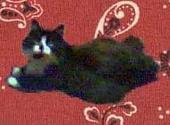While commenting on the music of Jenny Schneiman a couple of days ago, I mentioned how I feel about music genres and attempts at categorizing certain kinds of music. There are many problems that I have with such a practice. Some music is just beyond classification, and attempts to force it into some sort of box does the music a disservice and can even discourage certain people from checking it out, based on whatever genre label is slapped onto it.
Another issue is that genre names mean different things to different people. Jazz is certainly a label that evokes different reactions amongst everyone who confronts the term. Some people instinctively think of that smooth jazz muzak, the kind of uncreative, life deprived music that people like Kenny G produce. Others instinctively think of swing or big band music. Still others think of bebop and other similar forms of music, the type made famous by the likes of Miles Davis.
When most young people today hear the word jazz, they usually have one of two generalized preconceptions in mind. The first is that jazz is dead. What usually goes along with this sentiment is that jazz fans are either old, dead, or smart in the sense that intelligence is frowned upon in today's dumbed down world where bad is good and smart is dumb (that is if you want to be, like, cool or something). The other thing that may come to mind is that jazz is lame-o elevator music for soccer moms (think smooth jazz muzak here).
With this in mind, a problem arises if I want to talk to fellow young people about the music that I love. While I enjoy plenty of yesterday's jazz, including bebop, hard bop, west coast jazz, free/avant-garde jazz, and jazz fusion, I also spend much of my time listening to newer artists who are reviving jazz and improvisational music and taking it into new and uncharted territories. How do I spark potential interest in these new artists among young people who fall prey to those preconceptions that I mentioned above?
What makes it even more difficult is when I come across jazz promotions that revolve around contemporary artists who are living in the past, such as Wynton Marsalis. The reason why I'm writing this particular post is because I just learned of the grand opening of
Jazz at Lincoln Center. As long as jazz is being promoted as being about music made decades ago by people who are dead, and being commemorated by members of the living who play the same type of music, it is going to get a bad rap amongst youngsters who aren't interested in anything that is old. Along with the Lincoln Center news, I just learned of a new jazz club in New York City called
Dizzy's Club Coca-Cola, which promoters are referring to as being "NYC's hippest new jazz club". Hip? Maybe for grey haired suits and folks who are looking for a bit of nostalgia from an era long since past. I also can't seem to think of the last time that something truly hip had such a blatantly corporate name.
While I've never been to NYC, I have numerous recordings of fresh, lively, and most importantly, new music that is regularly being churned out of truly hip places such as
Tonic,
The Knitting Factory, and even
The Mercury Lounge, despite the fact that you can find plenty of different types of music there.
I've always thought that jazz music was supposed to be music steeped in the foundation of improvisation and constant evolution, music that changes over time and reflects the greater societal changes that we experience as we navigate through life. For so many people though, jazz is dead. Period. I suppose that I should get over this, especially since jazz is just another label that has been altered, worn out, and should ultimately be put to rest. The label is about as useless nowadays as political labels like "liberal" and "conservative". Even though such terms are all but useless, I still catch myself using them from time and time, even though I shouldn't use them anymore.
Aside from the reason I stated earlier about the state of contemporary jazz promotion, one could point to mainstream radio as another reason why so many view jazz as being dead. If you flip on the radio around here (or almost anywhere in the US these days), the stations all seem to follow specific scientific formulas handed down from corporate headquarters. The types of music one can find includes: R&B, hip-hop, country, classic rock, mainstream rock in general, top 40, and smooth jazz. Public radio stations may play various forms of good ol' jazz, but there are no stations that cater to new artists who specialize in improvisational music that some would call jazz. Lack of exposure creates lack of knowledge about these artists, and further exacerbates the preconceptions about jazz that young people have. This is unfortunate since there are plenty of young folks out there who would otherwise be able to share my enthusiasm for the likes of the
Jacob Fred Jazz Odyssey,
The Bad Plus,
Critters Buggin,
Skerik's Syncopated Taint Septet, and many others.
Ya know, I just can't come to terms with jazz being dead, and it's hard to convince people that it's still going strong with memorial services regularly taking place at venues like the Lincoln Center and Dizzy's Club Coca-Cola. Maybe I'll just steal a line from someone who was greatly influenced by jazz but was perhaps wise enough to distance himself from it enough to retain a sense of coolness. Frank Zappa once proclaimed that "Jazz isn't dead, it just smells funny."




















